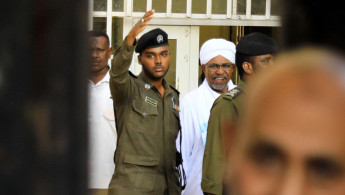Human Rights Watch urges Sudan's new government to hold Omar Al-Bashir accountable
Sudan's new government must make sure dictator Omar al-Bashir will be held to account.
2 min read
Omar al-Bashir is responsible for war crimes [Getty]
Sudan's new leaders must take leaps to ensure accountability for past human rights violations, including extradating former longtime dictator Omar al-Bashir.
"The new leaders, who were sworn in on 21 August, should set clear standards for the progress in the field of justice and a range of other reforms that must be completed during the three-year transitional period," the international human rights organisation said in a statement.
"International organisations, including the United Nations, the African Union, the European Union and other countries, should monitor the implementation of the agreement and make progress in major human rights reforms," they added.
Al-Bashir, who was overthrown in April following mass protests against his 30-year rule, is facing charges of possessing foreign currency, corruption and receiving gifts illegally.
He was further charged with incitement and involvement in killing protesters on 13 May.
Associate director of Human Rights Watch's Africa division urged Sudan's new leaders to bring Al-Bashir to justice.
"As Sudan's leaders are starting long-awaited necessary reforms, they must ensure justice to keep the promise of a transition to a state based on human rights and the rule of law. To ensure progress, they must set goals and standards, including accountability for grave violations, just as protesters demanded," she said.
The International Criminal Court (ICC) first issued an arrest warrant for him a decade ago, making him one of the ICC longest-running indictees ever.
Sudan's military rulers have said he would not be extradited to the court, located in The Hague.
The ICC warrant for Al-Bashir includes five counts of crimes against humanity, two counts of war crimes, murder, rape and torture.
"The new leaders, who were sworn in on 21 August, should set clear standards for the progress in the field of justice and a range of other reforms that must be completed during the three-year transitional period," the international human rights organisation said in a statement.
"International organisations, including the United Nations, the African Union, the European Union and other countries, should monitor the implementation of the agreement and make progress in major human rights reforms," they added.
Al-Bashir, who was overthrown in April following mass protests against his 30-year rule, is facing charges of possessing foreign currency, corruption and receiving gifts illegally.
He was further charged with incitement and involvement in killing protesters on 13 May.
Associate director of Human Rights Watch's Africa division urged Sudan's new leaders to bring Al-Bashir to justice.
"As Sudan's leaders are starting long-awaited necessary reforms, they must ensure justice to keep the promise of a transition to a state based on human rights and the rule of law. To ensure progress, they must set goals and standards, including accountability for grave violations, just as protesters demanded," she said.
The International Criminal Court (ICC) first issued an arrest warrant for him a decade ago, making him one of the ICC longest-running indictees ever.
Sudan's military rulers have said he would not be extradited to the court, located in The Hague.
The ICC warrant for Al-Bashir includes five counts of crimes against humanity, two counts of war crimes, murder, rape and torture.





 Follow the Middle East's top stories in English at The New Arab on Google News
Follow the Middle East's top stories in English at The New Arab on Google News


